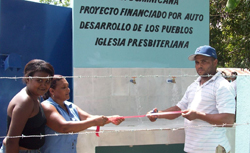In the province of Monte Plata in the Dominican Republic is the “batey” — bateys are squatter communities in rural Dominican Republic inhabited primarily by Haitians — of Bosque Centro. It’s a community of about 3,000 Haitian residents whose forebearers were brought to the Dominican Republic to work in the sugar cane fields.
Sugar cane production has long since gone, yet the residents of the bateys remain. Many are third and fourth generations born in the Dominican Republic. Most have never set foot in Haiti. They are a people without a country.
The government of the Dominican Republic will not issue them birth certificates. As a result, they get no government assistance for life’s basic needs, jobs, education, housing, and other services. In addition to not having access to basic human needs, most squatter communities don’t have access to sanitation or clean water.
But thanks to a partnership with the Presbyterian Church (U.S.A.)’s Presbyterian Committee on the Self-Development of People (SDOP), some of that is changing.
SDOP is partnering with the Movement of Dominican and Haitian Women (MUDHA), which works for basic human rights and services for people living in the bateys, and the Batey Relief Alliance (BRA). BRA concentrates on improving the health of the people living in communities that are fraught with illness and disease.
In partnership with MUDHA and BRA, more than 7,000 people in five different bateys will have access to clean water by the end of this year. As part of the holistic nature of these partnerships community residents are trained in maintaining the systems.
Other aspects of the partnership are nutritional and health classes and safer ways of disposing of garbage.
Cornelius Blanding, chair of SDOP’s International Committee, says “SDOP has been extremely thorough as we engaged in a three-year partnership with the people of the Dominican Republic. We began by exploring how best we could fund projects in this country. We spent a year learning about the country and its culture, what would work, what wouldn’t.
“Then,” he says, “we proceeded to develop partnerships with organizations on the ground that could assist in facilitating our goal of assisting communities of economically poor, oppressed and disadvantaged people. SDOP is very proud to be a part of bringing water to communities that did not have it, to assist in the economic development of women, and of our work with peasant farmers in the rural Dominican Republic.”
In Bosque Centro, Blanding continues, “The community came together and developed a project that gives them clean, running water. They developed the project, they own it and they control it. They are learning the system and how to maintain it. They also are becoming a healthier community.”
Reflecting on the ribbon-cutting ceremony last summer, Blanding says, “To be in on the project from the start, to be there at its inception ... then you actually see the water coming out. It was unbelievable! To watch the faces of people, who over the past two years have become friends, light up was truly a blessing — this experience transformed me.”
Maria Castro, a resident of Bosque Centro, adds: “We are very thankful for the water system because water is one of the most needed things in life. As we all know, water is life. If we do not have healthy water, we’ll have contamination and illnesses will come. We thank you again, and again. We encourage you to continue helping others.”
SDOP is one of the recipients of the One Great Hour of Sharing offering and is a ministry of Compassion, Peace and Justice ministries of the PC(USA)’s General Assembly Mission Council.

